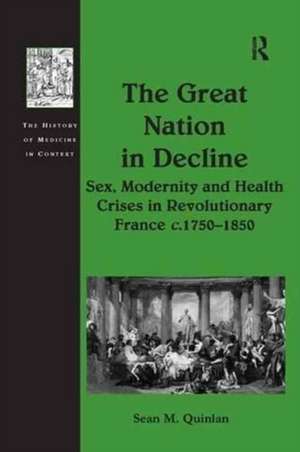The Great Nation in Decline: Sex, Modernity and Health Crises in Revolutionary France c.1750–1850: The History of Medicine in Context
Autor Sean M. Quinlanen Limba Engleză Paperback – 15 noi 2016
| Toate formatele și edițiile | Preț | Express |
|---|---|---|
| Paperback (1) | 469.34 lei 6-8 săpt. | |
| Taylor & Francis – 15 noi 2016 | 469.34 lei 6-8 săpt. | |
| Hardback (1) | 1112.34 lei 6-8 săpt. | |
| Taylor & Francis – 28 noi 2007 | 1112.34 lei 6-8 săpt. |
Din seria The History of Medicine in Context
-
 Preț: 311.70 lei
Preț: 311.70 lei -
 Preț: 311.41 lei
Preț: 311.41 lei -
 Preț: 325.55 lei
Preț: 325.55 lei - 8%
 Preț: 376.64 lei
Preț: 376.64 lei - 16%
 Preț: 338.33 lei
Preț: 338.33 lei -
 Preț: 489.26 lei
Preț: 489.26 lei -
 Preț: 492.53 lei
Preț: 492.53 lei -
 Preț: 469.34 lei
Preț: 469.34 lei - 18%
 Preț: 1000.27 lei
Preț: 1000.27 lei -
 Preț: 323.23 lei
Preț: 323.23 lei - 30%
 Preț: 824.80 lei
Preț: 824.80 lei - 18%
 Preț: 1054.71 lei
Preț: 1054.71 lei -
 Preț: 489.26 lei
Preț: 489.26 lei - 20%
 Preț: 819.35 lei
Preț: 819.35 lei - 26%
 Preț: 323.75 lei
Preț: 323.75 lei -
 Preț: 497.92 lei
Preț: 497.92 lei - 31%
 Preț: 764.20 lei
Preț: 764.20 lei -
 Preț: 486.76 lei
Preț: 486.76 lei - 25%
 Preț: 823.44 lei
Preț: 823.44 lei - 5%
 Preț: 464.79 lei
Preț: 464.79 lei - 18%
 Preț: 1009.74 lei
Preț: 1009.74 lei - 18%
 Preț: 1054.71 lei
Preț: 1054.71 lei - 17%
 Preț: 346.02 lei
Preț: 346.02 lei - 5%
 Preț: 1158.84 lei
Preț: 1158.84 lei -
 Preț: 489.26 lei
Preț: 489.26 lei -
 Preț: 469.34 lei
Preț: 469.34 lei - 18%
 Preț: 1110.92 lei
Preț: 1110.92 lei - 18%
 Preț: 1055.51 lei
Preț: 1055.51 lei -
 Preț: 469.34 lei
Preț: 469.34 lei - 26%
 Preț: 765.04 lei
Preț: 765.04 lei -
 Preț: 489.26 lei
Preț: 489.26 lei - 18%
 Preț: 1008.17 lei
Preț: 1008.17 lei - 18%
 Preț: 1006.77 lei
Preț: 1006.77 lei - 18%
 Preț: 1054.71 lei
Preț: 1054.71 lei
Preț: 469.34 lei
Nou
Puncte Express: 704
Preț estimativ în valută:
89.82€ • 93.43$ • 74.15£
89.82€ • 93.43$ • 74.15£
Carte tipărită la comandă
Livrare economică 15-29 aprilie
Preluare comenzi: 021 569.72.76
Specificații
ISBN-13: 9781138265486
ISBN-10: 1138265489
Pagini: 280
Dimensiuni: 156 x 234 mm
Greutate: 0.45 kg
Ediția:1
Editura: Taylor & Francis
Colecția Routledge
Seria The History of Medicine in Context
Locul publicării:Oxford, United Kingdom
ISBN-10: 1138265489
Pagini: 280
Dimensiuni: 156 x 234 mm
Greutate: 0.45 kg
Ediția:1
Editura: Taylor & Francis
Colecția Routledge
Seria The History of Medicine in Context
Locul publicării:Oxford, United Kingdom
Cuprins
Contents: Introduction: degeneration, regeneration, and health panics in modern France; A medical diagnosis of social crisis, c.1750-1770; Depopulation and institutional response, c 1776-1789; Colonial bodies and hygiene in the Antilles, c. 1750-1794; Doctors, regeneration and the revolutionary crucible, 1789-1804; Uncertain territory and fragmented agendas, 1804-1830; From cholera to degeneration, c. 1832-1852; Conclusion: degeneration and regeneration after 1850; Bibliography of printed sources; Index.
Notă biografică
Sean M. Quinlan is Associate Professor of History at the University of Idaho, USA.
Recenzii
’Quinlan impressively incorporates a wide range of printed sources for the eighteenth and nineteenth centuries to tell a sweeping story of medicine and politics. ... Overall, this is an excellent book that successfully accomplishes Quinlan’s objective of considering ’how doctors contributed to a much broader public discussion about physical degeneracy and depopulation in France between roughly 1750 and 1850’... The Great Nation in Decline is a lively and engaging contribution to the historiographies of gender, reproduction, public health and modern France.’ Social History of Medicine ’... whether readers accept or reject the larger claims of The Great Nation in Decline, they can be grateful to Quinlan not just for the lucid and perceptive readings of the individual texts but also for injecting new life into discussions of France’s contributions to the development of modern public health.’ ISIS ’This well written and thoroughly researched book - it contains a wealth of archival documentation - should appeal to anyone interested in the history of modern medicine.’ H-France
Descriere
This book studies how doctors responded to, and helped shape deep-seated fears about nervous degeneracy and population decline in France between 1750 and 1850. It uncovers a rich and far-ranging medical debate in which four generations of hygiene activists used biomedical science to transform the self, sexuality and community in order to regenerate a sick and decaying nation”a programme doctors labelled 'physical and moral hygiene'. The study argues that medicine acquired an unprecedented political, social and cultural position in French society, with doctors becoming the primary spokesmen for bourgeois values, and thus helped to define the new world that emerged from the post-revolutionary period.










